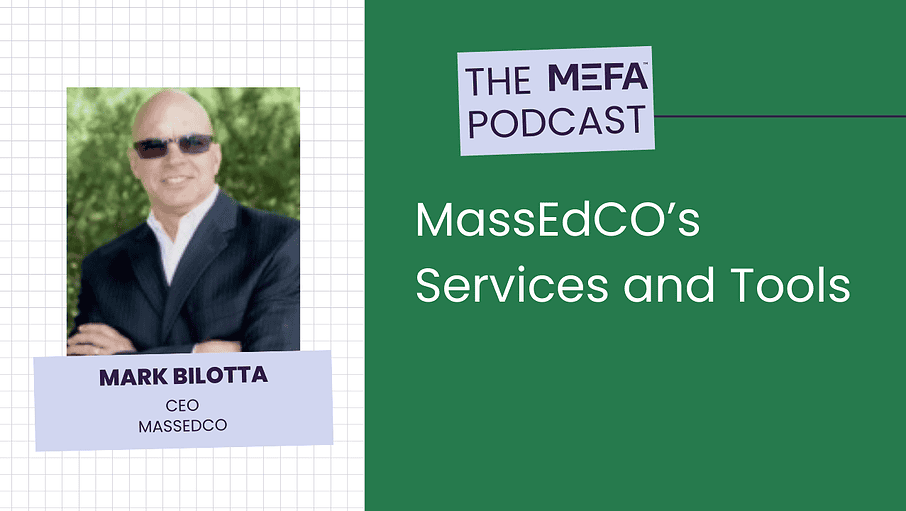

Resources Mentioned in this Episode
Jonathan Hughes: [00:00:00] Hello everyone and welcome to the MEFA Podcast. My name is Jonathan Hughes. And I’m Julie Shields-Rutyna. And as always, we have a great show for you today. Later on in the episode, you’re going to hear my talk with Mark Bilotta. Mark is the CEO of MassEdCO. MassEdCO is one of the great community-based organizations in Massachusetts.
It’s an agency that we work with a lot in our efforts to help families and students, and we’re going to talk about everything that they do. Financial literacy, college, non-college pathways, all sorts of stuff. But first, Julie, what do you have for us.
Julie Shields-Rutyna: So well we’re, recording this just as the calendar has turned to March and this is the time when students and families in large numbers are going to be receiving their financial [00:01:00] aid offers along with or closely following their admissions decisions.
So MEFA always wants to be there for families when they’re making this important decision. So we are going to start our paying the college bill.
Jonathan Hughes: Yeah. Okay. So why don’t you tell everybody, when you say campaign, internally, we talk about our campaigns, but what’s involved in the, in the campaign?
Julie Shields-Rutyna: Yeah, I know. Well campaign, what that is, is all of the different ways we’re going to get this information out to families. That’s going to be helpful. So we have a series of webinars. We have some in-person seminar. We also have calculators, videos, all sorts of resources for families who are in this circumstance. And we have a, a landing page dedicated to this.
So it’s mefa.org/college bound, and people can go to that site, they can watch a prerecorded webinar, they can register for [00:02:00] a live webinar, and they could also book a one-on-one appointment to go over their aid offers. You know, talk about all, all of, all the pieces to that.
Jonathan Hughes: Okay. So, and, and we’ll talk about the content and, and all that stuff, but I do like kind of how the, this campaign came about. So can you talk about that?
Julie Shields-Rutyna: Yeah, it was actually from college financial aid administrators who saw that after the awards went out, the award offers went out to families. Families were calling their office in great numbers because there are just a lot of questions that go along with that, and that’s a hard time of year for colleges to take all of those calls.
They take a lot of them, but they asked if MEFA could start a program. And at least get the basic general information out there to really find ways to compare the offers. All of that. We’re going to get into the details of that, but, they, they really asked us to put out some really good [00:03:00] information for this stage of the financial aid process and helping families make the best decisions.
Jonathan Hughes: Yeah. So, so then we can get into our guidance. What do we talk about in these sessions?
Yeah,
Julie Shields-Rutyna: Well we first go over some of the types of financial aid that you’ll see on your award offer. So we talk about grants, scholarships, work, study loans, and then. How to use our college cost calculator, which allows them to compare apples to apples costs and aid offers from the various colleges and see after that aid is applied, what’s really due. So we help them do that and compare, as we like to say, apples to apples and then we go over things like monthly payment plans, which colleges have. That available for families to pay their bill over time. And we talk about using any savings that they’ve, saved and about loans.
And then we give the general [00:04:00] timeline of when and how all of, all of this happens. Plus, you know, there are probably some students’ families that may not have applied for financial aid yet. We talk about that. We talk about what to do if you’ve been wait listed. So there’s a whole lot of information, for our families. Who are at this point of making that college decision?
Jonathan Hughes: Can you let everybody know how we, all the different ways we can, you know, interact with families aside from the in-person seminars?
Julie Shields-Rutyna: Yeah, so we used, you’re right, pre pandemic, we did these in person at, at high schools that mm-hmm. . And but during the pandemic we, when we shifted everything to being virtual, we do more of that now over Zoom and online. And it seems like families like that. And one of the things we used to say when we were in person is bring your award offers with you and we’ll, we’ll go over them with you. So now hopefully [00:05:00] when a lot of these are virtual, they have those offers on the kitchen table and we teach them about how to, how to look at those and how to compare and, and you know, use those in helping you make a decision because you really want to.
An affordable decision, affordable for the student, and affordable for the parent. I guess I’d say first step is to attend one of these, and you can, you can do that by going to mefa.org/college bound, and then you’ll probably get so much information there. But if you have questions after that, you can always feel free to then reach out again for a one-on-one.
Jonathan Hughes: Now let’s head to the MEFA Mail Bag. And these are questions that have come into us over the past few weeks and answered by our college planning team. And as always, if you have any questions, you can email us [email protected]. You can call us at 1-800-449-MEFA and you can reach us on social media on Facebook that’s [00:06:00] @MEFAMa, on Twitter that’s @MEFATweets and on Instagram, @MEFA_MA. And our question today comes to us from a caller. Who had a fairly common question actually about financial aid and it’s, it’s to do with the FAFSA. They have, they own rental properties and they want to know how that is reported on the FAFSA, income assets, et cetera.
Julie Shields-Rutyna: Oh, that’s great. Yeah. Well, I’ll, I’ll say that we know that a, a family’s primary residence, the home that they live in, is not reported on the FAFSA, so that’s important to say. But any other real estate rental properties are, and it’s reported as an asset, and it would re be reported by the, the worth minus any mortgage or debt on it. So sort of the equity in any investment properties, any rental properties would be reported as an asset, a parent asset on the [00:07:00] FAFSA. And then as far as income, any income, you know, say from rent or anything like that, that flows through the, the family’s tax return, that would just be incorporated into the tax return. And, and the bottom line, AGI, and that’s how that would get reported.
Jonathan Hughes: What if a n individual owns a two family house and they live in one and they rent the other part out?
Julie Shields-Rutyna: Great. Yes. Well then the part that they live in is their primary residence, so they only have to report the part of the house that is the rental property part. Great question. So they would do, you know, 50% of the worth and 50% of the debt.
Jonathan Hughes: Excellent. Okay. And that is a question I, it seems, you know, it’s a simple answer, but it is a question that comes up all the time. So thank you for answering that, Julie. Remember, if you have any questions, you can email us [email protected] or call us at [00:08:00] 1-800-449-MEFA. I’ll give up the social information once again on Facebook it’s @MEFAMa on Twitter, @MEFATweets and Instagram is @MEFA_MA. We have a bench of college guidance experts waiting to answer your question. Now let’s go to my talk with CEO of MassEdCO, Mark Bilotta. Since 2019, Mark Bilotta has been the CEO of MassEdCO, the Commonwealth’s largest community-based provider of education and career readiness services, the low income first generation college bound youth and adults.
Before that, he worked as the CEO for the Colleges of Worcester Consortium. He’s the author of the book Paying for College Before, During, and After, great title there. And he’s here to talk to us about paying for college. But I’ll stop talking now. We’ll let him talk, about himself. Mark Bilotta, well welcome to the MEFA podcast.
Mark Bilotta: Well, thanks for having me.
Jonathan Hughes: Tell us about yourself and what’s [00:09:00] led you to your current position as the CEO of MassEdCO.
Mark Bilotta: Sure, well, I’m one of 11 children and although neither one of my parents went to college, they had always prioritized, especially post-secondary education. So, you know, have always been a fan of recognizing that, folks don’t always enter post-secondary education with the same starting line. So we were considered low income. And you know, the irony of that being that the work that we do at MassEdCO is working with low income professionally, I’ve been in Higher Ed, most of my professional life. I started with, College Admissions. Two different institutions, Holy Cross and Worcester State, and then was fortunate enough to work at Assumption College for seven years on the President’s Cabinet, overseeing government affairs and community affairs, and working closely with the board and the cabinet members.
And then as you mentioned, I had an opportunity to work with the, 13 colleges in Central [00:10:00] Massachusetts on shared services, both for faculty and staff, and an opportunity to sort of take a look at higher ed as an industry, in greater Worcester and how it could better, meet the needs of the community and college students and faculty and staff. And then since 2013 have been associated with, MassEdCO which as you mentioned, works with low income first gen students.
Jonathan Hughes: Oh, thank you so much. And so tell us about MassEdCO then, everything that you guys do and who you are.
Mark Bilotta: Yeah. So we are as you mentioned working primarily with low income, first gen, middle school, high school students and adults.
And we actually started, in this arena back in the early seven. We’re one of the, 13 original educational opportunity centers. We have a statewide project. We work now with about 7,000 adults throughout the state. Who are looking to access some type of post-secondary education. And, and we specifically use that term post-secondary education as opposed to college. So that we [00:11:00] want people to be aware that a two or four-year degree isn’t the only option. For a lot of adults, especially it’s a short-term program. Maybe they’re working full-time maybe there. Looking to advance their career. So it isn’t just the degree seeking programs. So that’s been since the early seventies, working with adults.
And then in the early nineties we applied for a grant working with high school students and middle school students, talent search. And we’ve had the good luck of having that grant refunded every five years as well. And then in the late nineties we partnered with the. On a Gear up grant, and again, that’s school-based, so we happen to operate a program in Worcester and also with some partners in New Bedford as well as other sites.
So, you know, we, we basically are working with about 12,000 adults and youth each year helping them to understand all of the intricacies of applying and financing of post-secondary education.
Jonathan Hughes: And, and can you just talk about those programs really briefly? [00:12:00] Gear up and talent search?
Mark Bilotta: Sure. So our school-based programs try to work with students who are looking to access some type of post-secondary education. Typically, the criteria is low income, although we can serve with talent search and with Gear Up. Others. But our focus really is low income and in part because we know that they face a number of barriers to achieving their full potential. Some of it is as we’ll probably talk about later around a financial literacy perspective.
Some of it is just understanding the process. It can be overwhelming. So with both programs we. We provide opportunities either on an individual level or sometimes with field trips or, or other activities to college campuses or to events. Gear Up, for example, is getting ready to go to a Celtics game.
So it’s really an opportunity for folks to both bond and to learn about the process of preparing for some type of post-secondary education.
Jonathan Hughes: And so one of the things that I like about MassEdCO is that you do have this focus [00:13:00] not just on high school students, but on adult learners. And I actually didn’t know until you just told me that this was the original focus of MassEdCO. So can you talk about, you know, what you can offer adult learners and, and what’s different about you know, working with that population than with kids in high school?
Mark Bilotta: So the, the Feds define the criteria as 19 and older which in most cases mean they either have a high school diploma or a GED, although it doesn’t prevent us from working with high school seniors if they’re not being served by others.
I think the biggest distinction is that adults are busy. And so for many of our clients, they either have a full-time job or a part-time job. They recognize that some type of post-secondary education. Better fit their future needs both professionally and for their families. And so it becomes an opportunity for us to recognize that that’s where they’re starting from as opposed to a high school senior.
And not that high school seniors don’t have their own barriers, but they’re just different at that point in their lives. [00:14:00] So I think for our adults we tend to look. What is feasible? What are their wishes? It could be a degree seeking program, but for some, it’s really a short-term program. So that they can approve their potential income as well as maybe apply that certificate towards a degree at some point. They tend to drop in and out more often from school, depending on life circumstances. So it requires being nimble encouraging them to help reach their potential and making sure that they know we’re available whenever they need us.
Jonathan Hughes: What assistance can you give anyone seeking a, a post-secondary education that isn’t college?
Mark Bilotta: So I’ll distinguish it because there are some colleges that offer short-term programs. So when we talk about non-degree options, you know, we look at anything from, you know, three months to maybe a year and a half but something that’s not degree oriented.
And so we might work closely with the state through MassHire who may have funds that are specifically tailored towards short-term programs. We might work with a community college or even a [00:15:00] four-year college that might be offering certificate programs. Again, taking a look at what the needs are of our client.
So I’ll use healthcare for example. Someone might be interested in going from being a clerk at a. and wanting to look at healthcare. So maybe we get them a really quick short-term program in phlebotomy, you know, and they can do that relatively quickly. A matter of a few weeks. And now they might get a job as a phlebotomist, and now they’re in a healthcare setting and they say, you know, I kind of like this environment.
Maybe I’d like to go on and do something more. So maybe they say, you know, I think I could do an LPN, and so we’ll assist them with preparing for that, both from an admissions and financial perspective. And then they can come back to us after they’ve completed an LP n and say, you know what? I’m wondering if maybe an rn, you know, might be feasible for me.
So again, we’ll counsel them on the process for that. So that short-term program got them what they were looking for at that. Which was maybe a, a shift in their [00:16:00] occupation, in their career, or a bump in pay whatever it may be.
Jonathan Hughes: When I think of MassEdCO, I think of a really deep sort of touch type of organization.
Mark Bilotta: It can be. So, you know, I would say for our school-based folks they probably have more FaceTime. With high school and middle school students than our educational opportunity center staff who were working with adults that can be more light touch. Someone comes in, they just need some help completing their FAFSA.
But for others it could be that we’re doing some career development discussion. We might be doing some counseling on other barriers that they might face, trying to maybe put them in touch with some other services that might help address a barrier. You know, it could be a transportation. It could be childcare, you know, it could be a host of, it could be food insecurity, you know, so we’re looking to see how can we help them with their barriers so that we can keep them sort of focused on the goal, which is completing some type of post-secondary education.
So, sometimes EOC can be light touch, but it doesn’t have to [00:17:00] be in on, in all cases.
Jonathan Hughes: Financial literacy. I know that that is a, a passion of yours. So you see the smile? Yes, yes, I did see it. Yeah. Well, good then, then I’ll just let you talk about it then.
Mark Bilotta: Yeah. I think that the challenge for me, Jonathan, is that I don’t think that we’ve approached historically a major financial investment like we do in other arenas.
So I use the example when you’re looking to shop for a house. There’s a gatekeeper called the bank or the mortgage company that’s going to tell you how much you can qualify for in terms of borrowing. We don’t have that in, in, in, in higher ed. You can borrow as much money as you can find, which isn’t necessarily good for people who don’t understand what’s coming down the pike in terms of their capacity to repay. So I think part of it is trying to get students and to some extent adults. Up to speed on financial literacy so that they [00:18:00] understand the ramifications of any decision that they’re going to make, not after they’ve made it, because after they’ve made it, it becomes a little bit more challenging to either change their direction because they now started to invest in something that maybe they couldn’t have afforded.
Or to try to figure out how we can save them some time and. So that they’re not overburdened down the pike, but that’s probably my biggest concern is that we have people making major financial decisions. Without the financial literacy skill to make sound decisions.
Jonathan Hughes: And we’re going to talk about that now because this is March, we’re recording this in March. And so this is the time when people are really getting a lot of their financial aid offers from their colleges before they make that decision about where they’re, where they’re going to go. Just focusing on college for the moment. So what, when should students start thinking about cost?
Mark Bilotta: I’d say middle school, well, you know, [00:19:00] because the reality is, is that you really want people to have an understanding of personal budget, you know, because in the end, that’s what this is all about, is your ability to repay, for example, if you have to take out loans. So how do you teach someone how to handle money responsibly?
And I think that starts at a young age if parents can do it. And the challenge that we have in Massachusetts in many states is that we don’t mandate financial literacy in our K through 12. And so it really is up to families to teach their children about financial literacy. So if we have families that are struggling with understanding the concept of financial literacy, you can appreciate our work becomes that much more important.
So when you ask how early I ideally the senior year, summer before senior year they have to take a look at this like a budget. So the issue I would ask the question I would ask is, how much can you afford? That’s not something that people think about, you know, again, when I use the [00:20:00] example of buying a house, that’s the first question, you know, that comes to mind.
Why am I going to tease myself with a $20 million mansion when I can afford a $250,000 home? Well, when we throw students out into the universe and say, oh, go look at any college you want, and then they fall in love with the. And they still haven’t had any discussion with anyone about how much it’s going to cost.
So I would like to see students have an appreciation of what they’re expected to pay as a family. And as you know, there are ways of getting an estimate of that. And then how much a. A college may cost. Now I give the US Department of Education credit for mandating net price calculators years ago where every college is supposed to have a working net price calculator.
And that’s where students and families can put in financial and academic information and it should spit out an estimate of what you might get in terms of a financial aid [00:21:00] offer. Unfortunately, there aren’t a lot of schools. That really have what I would call an in-depth net price calculator.
That’s going to factor in how much scholarship aid is available by that institution. So what some of them do is they only ask a few questions. And really what they’re going to tell you is what you’re going to be eligible for in terms of federal assistance and maybe state assistance. So I’d really like to see that addressed, but at least it’s something to get people having a discussion.
And then I want, when students are starting to go around to college visits or college fairs, I want them to ask financial related questions. You know, back in my day when I was in admissions, I’d get questions about how’s the food, how are the athletic facilities? What’s the social life like? Seldom, if ever, did I get anything of a finance related question, so, you know that I, I’d love to st you know, for students and families to ask those more probing questions.
And then I think to have an idea of what’s affordable. [00:22:00] If the family has had a discussion of what maybe a parent, a parents are going to contribute towards a student’s education, what the student might be expected to contribute towards a student’s education. And then have a budget in mind so that when the financial aid offers start to come in they’re either not caught off guard or they’ve got a realistic perspective, you know, of what their choices might be.
You know, at the end of the day, for us, it’s make a sound decision that’s not going to burden you for life with debt because we know the ramifications of that.
Jonathan Hughes: So what can MassEdCO offer? For, families or for students to, to help them to do what you suggest?
Mark Bilotta: Yeah, so we have a, we have a couple of tools that we use and certainly MEFA has wonderful tools as well and there are other sites. But you know, the first one that I would use for us is is your ability to borrow. That’s a tool on our website, massedco.org and what that does is it provides three calculators and asks you to take a look at working backwards, [00:23:00] which is when all is said and. What do you think you’re going to be making as a starting salary?
So, I use the example, let’s say you’re a high school senior and you’re thinking, I might wanna be a teacher. So you maybe do a little investigation, maybe you see that the average starting salary is 45,000. What the first calculator does is, is, is says take that 45,000 and divide it by 12. And so let’s say it’s $3,700.
So $3,700. The calculator’s going to quickly tell you after taxes, this is your monthly take home. Now we take that figure and we automatically insert it into the second calculator, which is going to tell you about your personal budget. Now, rule of thumb with personal budgeting is you should be looking at 50% of your take home pay as meeting your needs.
And that might be housing that might be other needs. And then 30% for wants. And we don’t get into the business of deciding for you what our needs are wants, but for, for wants, it’s that 30%, [00:24:00] it’s the the last 20% that we focus on. So it’ll automatically take that 3,700. Yeah, actually the after tax money, which will be about 27, 27, 80, 20, whatever may be, it’ll take that figure and it’ll divide 50%, 30%, 20%.
The last 20% is what we take a look at, which is your borrowing your, your debt and your savings percentage. Now we’re going to take that, that 20% and put it into the third calculator, and that automatically tells you how much you can borrow if you use our rule of. Which is you shouldn’t be making payments more than 10% of your after tax monthly income.
So that third calculator will take a look at that 20% and divide it by 50 and say, okay, let’s say it’s $280. Is that 20%? Actually it’ll be $560. It’ll say you can afford a payment of $280 a month without sacrificing your financial future. So now [00:25:00] you know your ability to borrow because it’ll tell. For that $280, you can borrow about $27,000 at 6% interest actually at 4.99% interest.
So it’s really just a point of discussion, you know? Okay, so if I can borrow that amount of money, now I go back and I start to look at maybe financial aid offers or those net price calculators. But what we have to remind folks is you said you wanted to be a teacher which means you’ve got to get a graduate degree.
At the end of the day, there’s only one paycheck. So now you’ve got to take a look at stretching your borrowing capacity over your undergraduate and graduate years. And that’s where a lot of people make the mistake. They spend all of their borrowing capacity at the undergraduate level. Hmm. And what they end up doing is taking all loans for graduate school, which then bumps them from that 2,700 quickly to 60,000. So it’s really trying to take a look at the long-term [00:26:00] planning, not the short-term planning, because a lot of families will, you know, unfortunately, take a look at one year of funding and they’ll say, oh, we can do that, right? Only to discover that they’ve exhausted their savings. And no, they can’t return for second year. So you really have to take a look at that long term, which is why the book was called Paying for College Before, During, and After, because after can be a long period of time.
Jonathan Hughes: Not a lot of parents know that because we tend to talk about student loans and, you know, students in debt and, and et cetera, that they don’t really know that most of the times parents are gonna be responsible for this as well.
Have you had the chance to counsel many families on sort of that, that importance of communication between students and parents?
Mark Bilotta: Yeah, I, you know, I, I would say unfortunately parents are probably less engaged with our work than we’d like at the, at the high school level and with adults. We don’t tend to have that parent [00:27:00] discussions.
Usually the student themselves, I’d like to see parents more engaged. I mean, we can offer, you know, evening programs especially, or afternoon programs or invite parents, but they’re not as engaged as we like. So really part of their education is coming from either their student directly, their son or daughter directly, or from what they’re reading. So yes, I’d love to see more parent engagement, but I think, you know, historically we see parent engagement decreasing as students get older, you know? Great, you know, great engagement at the elementary school level, decreasing slightly at the middle school level, you know, even more at the high school level.
So it’s how do we get them, you know, engaged is really part of this because we’d love to have parents having discussion about budgets with their children as early as possible. You know, I, I recall one family that I was working with years ago, and the son or daughter was told how much, you know, they were gonna budget for, and the senator daughter said, wait, what happened to all our money
And my friend, the [00:28:00] father says, oh, yeah, wait, wait. Not our, my, our mother and i’s money and we spent it on feeding you, you know, and housing, you, you know, that type of thing.
Jonathan Hughes: Are there any other tools that, or services?
Mark Bilotta: Yeah, so the second tool that we have is what we call the Financial Aid Comparison Tool. And that’s where folks can take a look at their financial aid offer. And they actually start to input the specifics of their financial aid offers. And one of the reasons why we do this is that unfortunately higher ed is not as clear, I think, as they could be with the financial aid offers.
Certainly one of the things that we would hope is that when you receive an offer, it’s clear that these are your costs. And this is what your financial aid offer is, but all too often they don’t even include the costs with their financial aid offer communications. So it really is an opportunity for students to compare apples to apples to apples.
So it allows you, for example, you can put as many college as you want. But let’s say you, you have three [00:29:00] colleges. It allows you to put all of your scholarship and actually force you to put all the costs. So if they send you those, Information easy. If not, you’ve got to go find it right on their website, whatever it may be. And with community colleges, it becomes even harder because they’ll start to break down by credit hour. So it can be laborious, but you’ve got to do it. So after you’ve got your costs, then you start taking a look at what we call the free money, which is the scholarships. So then it’s going to draw our line and say, okay, this is what the college expects you to.
This is before any loans are considered, right. Below that is these are ways that you can pay that net price. And so the net price becomes now the starting point for discussion. And that’s where, you know, in some cases the private schools end up being better than the publics. Because if that school really wanted you, they’re going to find a way of giving you significant institutional aid.
So the other thing that we do is we clarify [00:30:00] work. because work study will be included in a financial aid offer. And most people don’t even understand the concept of work study. And we have to remind them that in order to be eligible for work study, you have to have a job. In most cases it’s going to be on campus.
And the reality is, is that paycheck, and I’ll make this up, might be $200 every other week, and that’s probably going to be your pizza money. So you, and you’ve already paid your bill. Your bill is probably going to be due July or. So now you’re, you know, you work at the, so what we do is we take that work setting, we put it at the very end, we include it, but we don’t factor it into financial aid.
So I think it’s a great tool for people to be able to compare. Apples to apples to apples.
Jonathan Hughes: How can people actually find you and, and interact with and get these services?
Mark Bilotta: Sure. The quickest way is if we’re not providing services at your school with our town search or Gear Up you can contact MassEdCO just by our website, massedco.org and it’ll direct you based on what your needs are if you’re a high school student, if you’re an [00:31:00] adult, and it’ll give you tools that you can use. Like we have a checklist for high school students. We’ve got a checklist for, for adults to access. And then they can always call us and we can schedule an appointment if that’s what they prefer.
Jonathan Hughes: Before we go, do you have any piece of advice for any, you know student who’s looking to start a college or for any adult who may be looking to, to supplement their income or, or, you know, grow their career with, with some post-secondary education?
Mark Bilotta: Everyone deserves to reach their full potential. And I think that there are a lot of resources out that can guide you. There’s a lot of money out there that can reduce your costs. But I would say that it really is on the student or the family to be able to access those services that can be really helpful and can prevent what I consider to be, you know, a ball and chains in terms of financial burden if you make mistakes.
So we’re more than happy to answer questions or counsel students and families on these.
Jonathan Hughes: Oh, Mark, thank you [00:32:00] so much for joining us. I really enjoyed this conversation.
Mark Bilotta: Thanks, Jonathan. Be well.
Jonathan Hughes: Okay, folks. Well, that about wraps it up for us. I want to thank Mark Bilotta for being here. And remember, if you liked what you heard today and you want to know more about planning, saving, and paying for college career readiness and reaching financial goals, you can follow us on Apple Podcast, Spotify, Stitcher, wherever you get your podcast.
And please remember to review us. It helps us keep doing what we are doing. And getting this show out in front of people like you. So Julie, thank you once again for joining me today.
Julie Shields-Rutyna: Thank you, John.
Jonathan Hughes: I want to thank Shaun Connolly, our producer and AJ Yee for his assistance in posting this show. Once again, my name is Jonathan Hughes and this has been MEFA Podcast. Thank you.













